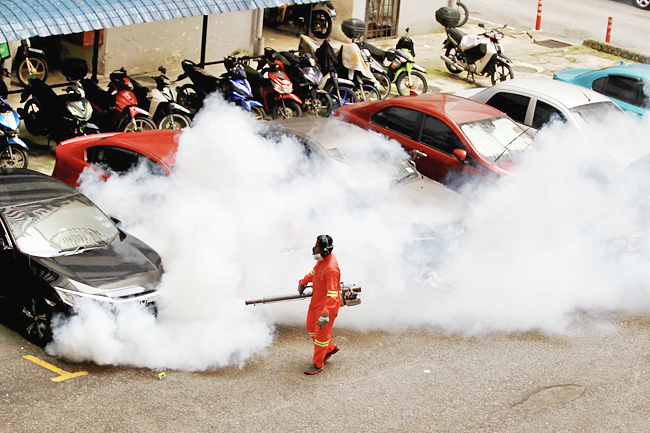ANN/THE STAR – Amidst daily reports of dengue cases and hotspots, Malaysians are facing an uphill battle. For many, despite efforts to keep a clean and tidy household, the threat of dengue continues to lurk in dark corners of the home as well as among the lush greenery that is the hallmark of the tropical weather.
In many instances, the bits of waste from takeout containers and other vessels, combined with clogged drains, construction sites and other realities of urban life offer endless opportunities for rainwater to collect, drawing the dreaded Aedes to breed and continue the vicious cycle.
But is there hope on the horizon? Perhaps.
Malaysians are no strangers to the dangers of dengue. However, after years and even decades of hearing the same advice to destroy breeding sites and prevent bites through mosquito screens, dressing to cover exposed skin and use of mosquito repellents, Malaysians want something more.
In the #JomHalauDenggi survey conducted with over 1,000 respondents by Star Media Group in collaboration with Takeda Malaysia from November 21 to December 4 last year, eight out of 10 participants acknowledged that everyone is at risk of getting dengue fever and are taking preventive measures to protect themselves and their loved ones.
However, these measures are resource-intensive, in the form of time and effort to check the home and premises for breeding sites, as well as the cost and inconvenience of using various forms of mosquito repellents on a daily basis.

This was cited as one of the main challenges in fighting dengue, and despite much-lauded gotong-royong efforts in some communities, where residents come together to clean and maintain their surroundings, not all neighbourhoods exhibit the same level of dedication.
Some respondents felt that their own communities are less dedicated to keeping their environment clean.
Even more concerning, the survey revealed that some people still view dengue lightly despite the disruption dengue can cause to an entire household, with two per cent responding that they ‘don’t think dengue is all that serious’.
Parents may find themselves juggling the responsibility of caring for one or more sick children or elderly parents, all while managing their daily necessities. This can extend to missing crucial days of school and work, and in severe cases, may even require hospitalisation.
Serious complications, such as organ damage, can further exacerbate the situation, leading to a prolonged and lasting impact on their health – a phenomenon commonly referred to as ‘long dengue’.
Beyond the impact on health, the emotional toll of worry for a loved one’s recovery, combined with the financial strain of medical expenses, can be particularly burdensome, especially for those struggling to make ends meet.
FILLING IMPORTANT GAPS IN KNOWLEDGE
While inconvenient home checks and misperceptions about the severity of the disease add to the challenge, the true weapon against this invisible threat is a well-informed community.
Some respondents cited a lack of knowledge as one of the top three barriers to action. Only 59 per cent of respondents knew that a past dengue infection does not guarantee future immunity, and 42 per cent were unaware that a second infection carries a higher risk of severe dengue.
Even more concerning, 62 per cent did not recognise that severe dengue symptoms emerge after the initial fever subsides.
These critical knowledge gaps highlight the urgent need for frequent public awareness efforts on recognising dengue risks, especially its seriousness should a person be infected for the second time and the warning signs of severe dengue.
Malaysians need to be able to recognise the warning signs and seek medical advice early if they experience symptoms like high fever, severe headaches, joint and muscle pain, and skin rash.
More importantly, they need to also be aware that dengue may progress to a severe form, with symptoms such as bleeding and rapid drop in blood pressure which are medical emergencies that require immediate care.
With the threat of dengue always present in Malaysia, knowledge of what to do and where to go is essential, and so is the awareness about future methods for prevention.




